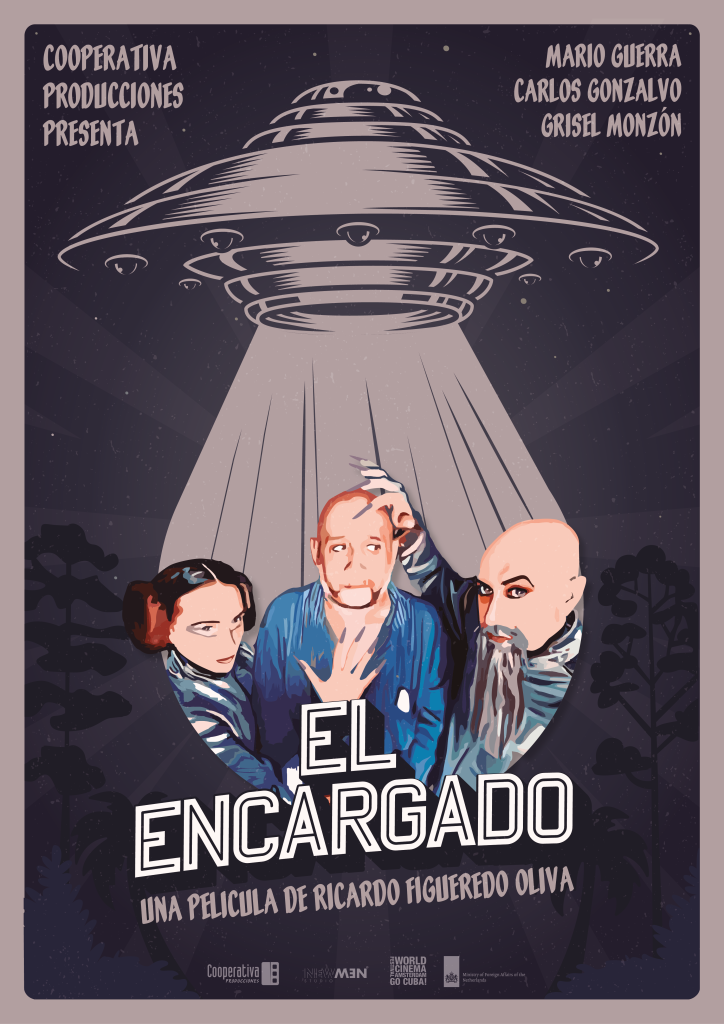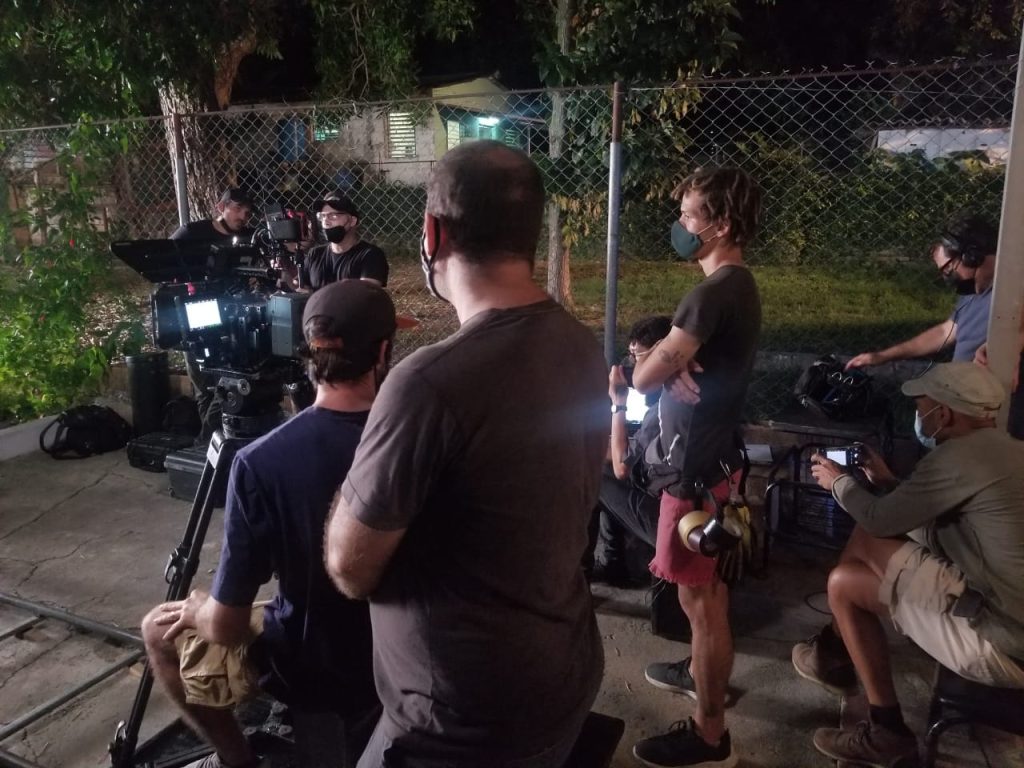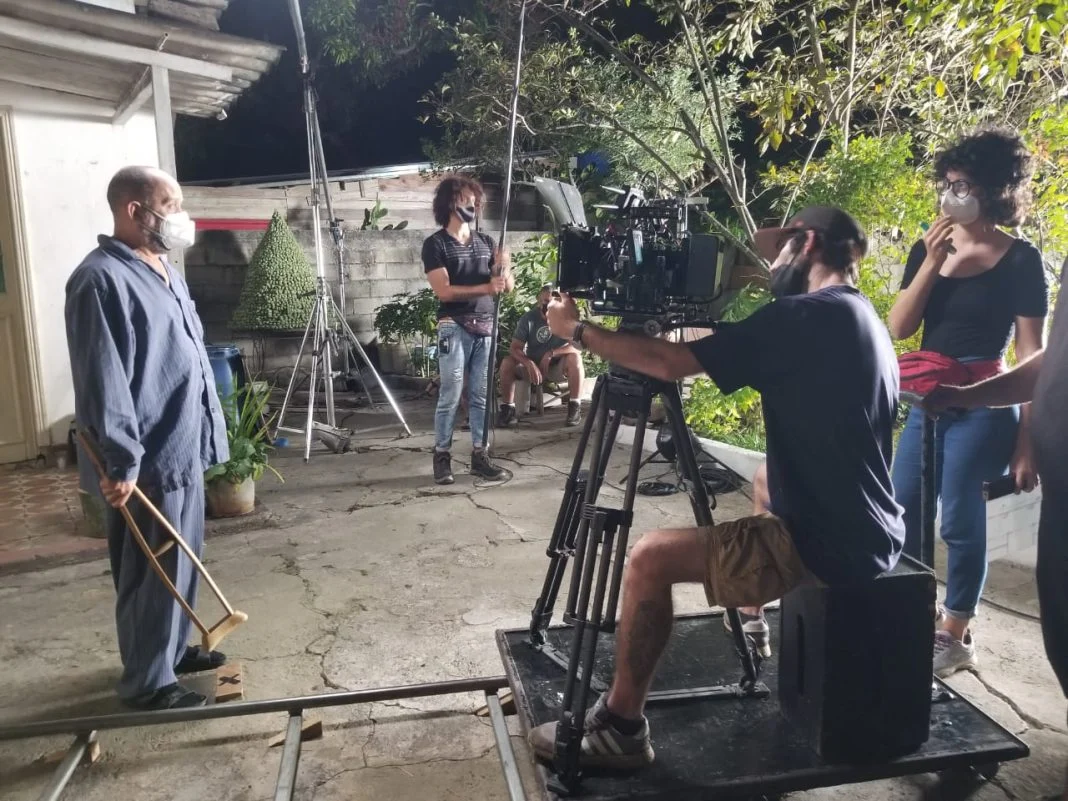Ricardo Figueredo Oliva (1972) is a Cuban director, producer, and screenwriter, a graduate of the International Film School of San Antonio de los Baños (EICTV) and the New York Film Academy Workshop. Throughout his career of over 20 years, he has accumulated several fiction and documentary short films, including Despertar [Awakening] (2012), Operación Alfa [Operation Alpha] (2012), La singular Historia de Juan Sin Nada [The Singular Story of Juan With Nothing] (2016), La teoría cubana de la sociedad perfecta [The Cuban Theory of the Perfect Society] (2018), Rojo, Amarillo, Verde [Red, Yellow, Green] (2020), La Habana de Fito [Fito’s Havana] (2021), Los océanos son los verdaderos continentes [The Oceans Are the True Continents] (2022), and El encargado [The Post] (2023). Like most of his work, The Post was censored in 2023 by the Ministry of Culture (MINCULT) when it was attempted to be socialized as part of an Audiovisual Jam Session organized by the Performer Chair, an initiative of the theatrical project El Ciervo Encantado.
Figueredo’s work has often been omitted from festivals sponsored by the institution in Cuba, so access to his filmography has been regularized through alternative distribution channels. Regarding the recent Honorable Mention received by The Post at the 4th International Cannabis Film Festival (FICC) in Buenos Aires, the Cultural Rights Observatory talks with its director about the topic addressed, filming conditions, Cuban reality, and his perspectives as an artist.

Your cinema delves into areas that censorship targets. Is this the purpose of The Post?
I will always attempt to make entertaining cinema and through it, attempt to make a sharp analysis of Cuban society, which has had its dreams lacerated for so many years. The political regime in Cuba has questioned any semblance of freedom, whether political, cultural, or simply pleasurable, and my position as an artist is to take revenge against this attitude, even if my reward is censorship.
The Post is a simple man faced with the alternative of evasion. However, things only get more complicated. Is alienation a path, or only those who are unaware of Cuban reality can suggest it?
The Post is the typical Cuban conditioned by his indoctrination environment, the Cuban who truly believes that “lemon is the basis of everything” and even though he understands that the society in which he lives is a disaster that suffocates him, he would never dare to do anything to change it, he is the gullible character who has never questioned the need to fight for his rights and for this very reason, his life becomes complicated. The film The Post, through the cannabis theme, attempts to decipher the falsehoods of freedoms that are touted by countries without democracy and with severe zero-tolerance sentences towards any kind of natural transformations. That’s why I use the metaphor of a being from space who proposes to investigate and think about rights in the face of any prohibition and proposes another perspective of observation. This seems like a nightmare to a man not accustomed to hearing this kind of argument.
Although the economy of resources and the independent nature of the production are evident, it is easy to assume certain levels of complexity in a project like this. Tell us about that.
It was a real challenge for me to bring this film forward; I worked on it with a lot of discretion to avoid premature censorship during its filming, so I limited myself to sending it to a few funds. I received support from artist friends, managed to get little money, and had a super professional and friendly team that ventured to film all of that in just one night. I had a cast of luxury actors and an overall impressive vibe (that is something that is worth more than all the money in the world).

Why marijuana?
Cuba has been a strong opponent of imperialist policies for over half a century, but it has followed the policy on these substances that the United States implemented on a global scale, especially in Latin America, where it has generated discrimination and racism against black and indigenous communities. Regarding this, I have always thought that if there were a place in the world where marijuana should be legal, it is in a country that is truly revolutionary. However, Cuba is a country where criminal sentences in this regard are disproportionate (as are almost all). The hypocrisy and lack of truthful information surrounding this phenomenon have always made me wonder how they are trying to protect citizens’ health by supposedly keeping them away from drugs and bringing them closer to the prison and marginal world that takes solutions to a disproportionate level where marginality and lack of education have committed irreversible errors in society. Marijuana in Cuba is also another excuse used to blame or pressure people who do not have politically established thoughts, and it is even contradictory to think about how and in what way these substances are spread with the gigantic surveillance and repression that exists on that phenomenon.
Those of us who have traveled the world or have researched this issue can compare how this topic is handled in countries with a bit more of a democratic culture and how more and more countries are joining in to experiment with legalization for recreational, industrial, and medical purposes. I just tried to open a crack so that, from our idiosyncrasy, we can demand various rights that have been denied for decades, and it seems as valid as all the causes that are still pending in Cuba.
In 2003, the Cuban government carried out the major anti-drug operation called Operation Coraza. That offensive included the closure of a socio-cultural project like El Patio de María and harassment of youth socialization sites, among other repressive actions. How did you experience it? What do you think has been the outcome twenty years later?
Every solution from this Cuban system that proclaims itself as egalitarian is repressive. They have never given people the opportunity to express the desire for how they want to live their lives or how they could make proposals and demands to make their coexistence more sustainable. They have never tried, within their macabre experiment, to provide solutions or have an open dialogue with young people to understand them and support them in the process of building a free society with fewer restrictions and prohibitions. The result of all these actions of lack of dialogue and tolerance is mediocrity, lack of education, and respect that reigns in present-day Cuba at all levels, and they are responsible for it. Cuba is currently a country with a high growth rate of femicides, murders, assaults, alcoholism, and a lack of compassion and solidarity for the precariousness of life and the inherent distrust that everyone has toward everyone else, leading to an unprecedented exodus with no possibility of controlling it.

We know that you are well acquainted with the face of artistic censorship in Cuba; the echoes of the attack on Fito’s Havana, a documentary in which you participated as a producer, still resonate. Would The Post have any chance of being exhibited on the island?
They will not accept it, and I knew beforehand that it would be this way. The Post was one of the films that were censored along with Fito’s Havana by Juan Pin Vilar and Exist, by Fernando Fraguela, at the headquarters of El Ciervo Encantado. The tremendous cultural bungles that followed that action, especially with the film about Fito, are already history; it’s the same thing that has happened with almost 600 films in the last 20 years. Only this time it was different, and this violation of stealing and exhibiting the film without permission, criminalizing its director and Fito, accusing him of being ignorant of Cuban history, once again fired up a school of creators who had caused a stir in previous years and ended up with the removal of the stubborn president of the ICAIC, but this time with an Assembly determined to see the matter through to the end and still awaiting responses to the charges filed.
The leadership of the ICAIC has changed. What does this represent in terms of the exercise of cultural rights by Cuban creators and the public?
I don’t believe that changing the leadership of an institution will lead to substantial changes in society. We know where the head of the leader who challenges a superior or has a different initiative than that established by the censors will end up. The good thing that has happened with all this is that filmmakers have finally united to demand rights against censorship and exclusion through the Filmmakers’ Assembly, and it has been impossible for them to ignore the demands, which is what they usually do. This time they have had to agree to meet and listen to what a guild saturated with so many unfulfilled promises and so many abuses has in store for them. Hopefully, all these actions will serve as an example for every labor guild in the country to sing to their association leaders and demand explanations without fear about the various abuses suffered by Cuban workers.

You have said that your time at the EICTV made you decide to make Cuban cinema from Cuba. Will you continue to try?
I will always be willing to make movies from Cuba. The San Antonio de los Baños Film School, besides training me as a filmmaker in the early 2000s, also trained me as a committed artist. I understood and became passionate about how important it was to record your time. Julio García Espinosa said a very interesting phrase to me: “A country without images does not exist,” and I felt like I lived in a country without images, at least of the reality from which I came. I formulated the idea of being a defender of an art that serves to expose our political and social ordeal. We have many debts to past and future generations, there are many untold things, and I hope that cinema and art in general will be part of that process.
What’s next for Ricardo Figueredo the filmmaker?
I am in a new stage, a difficult stage of my life; I never imagined living outside the island, I never imagined that at 51 years old I would have to rethink how to mend my life, and that does not make me one hundred percent happy. I have seen with pain how artists and activists not only from Cuba but also from Venezuela or Nicaragua, who have the same political problems, have been left to their own devices and do not receive support to spread their experiences as immigrants or political refugees. The subsidy agendas for art destined for our countries are somehow complicit in the misfortune that still persists in marginalizing those of us who tried to raise our voices through art in our countries of origin. In Argentina, as in much of Latin America, cinema is going through desperate times, political disinterest, lack of policies for funds, and guarantees. I am committed to fighting for the conservation of cinema in Latin America and addressing the lack of unity and action from the New Latin American Cinema Foundation. I believe that cinema should not only entertain but also serve as a representation of the struggle of countries to liberate themselves from dictatorships.
* Translation by Fiona Baler.



